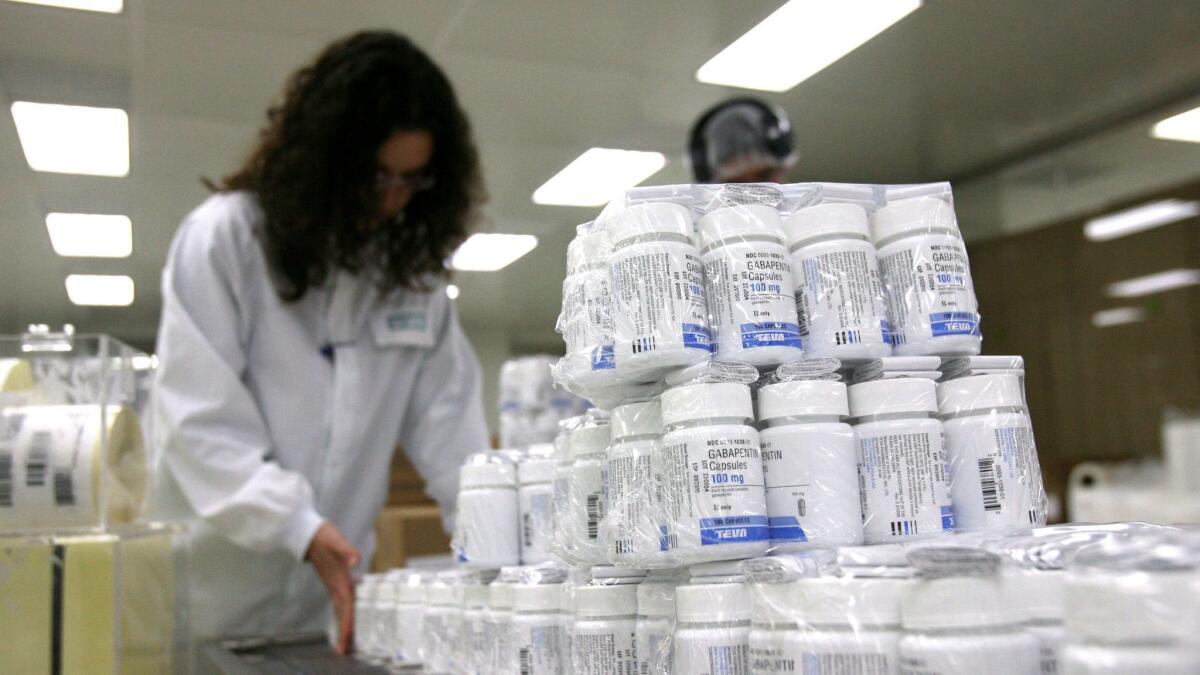Column: The government quashes a nasty stunt used by Big Pharma to keep drug prices high

- Share via
Most of the efforts out of Washington to fight rising drug prices amount to all-talk-no-action. But there’s one government campaign that has worked — and that the government just expanded.
This is the government’s attack on so-called pay-to-delay schemes, in which the marketer of a brand-name drug pays off generic drug makers to keep their competing products off the shelves, sometimes for years.
The Federal Trade Commission, which has scored a string of courtroom victories against pay-to-delay in recent years, estimated in 2010 that these deals were costing consumers $3.5 billion a year. This week the agency announced that it has made its landmark case against a generics manufacturer even more airtight.
We were able to get six more years of patent protection. That’s $4 billion in sales that no one expected.
— Drug executive Frank Baldino explains the value of keeping generics off the market
The manufacturer is Israel-based Teva Pharmaceutical Industries, the largest generics maker in the world. Teva settled a previous FTC lawsuit in 2015 for $1.2 billion. But that deal left open a couple of loopholes — the “two most pernicious and common forms” of pay-to-delay, the FTC says. The settlement announced Tuesday shuts the door on those, too.
Before we get into the details, here’s the back story on pay-to-delay. As we explained in 2011, these deals were spawned by the Hatch-Waxman Act of 1984, which was designed to encourage the development of cheap generic drugs to rival the patented brand-name versions.
Under the law, a company can seek to market a generic product before the patent on the original expires, typically by filing a lawsuit challenging the existing patent as invalid. As an incentive, the law awards six months of exclusivity to the first generic maker to reach market, allowing it to fend off approval of competing generics by the Food and Drug Administration for that period.
The law effectively eroded Big Pharma profits, since challengers won nearly three out of four patent challenges in court. The branded drug industry reacted by paying generics companies to keep away. The patent holders got months or years of comfy monopoly marketing, and the generics companies got money, a break on costly litigation, and sometimes the guarantee of a monopoly period for their own products.
The deals are sometimes called “reverse-payment” transactions, because they involve a patent holder paying an alleged infringer, rather than the other way around.
Even big payments to generics companies can be worth the expense. That was made clear in 2006 by Frank Baldino, then the chief executive of Cephalon, which the FTC had charged with paying more than $300 million to several generics companies to get them to drop patent challenges to its narcolepsy drug Provigil.
“We were able to get six more years of patent protection,” Baldino crowed publicly. “That’s $4 billion in sales that no one expected.” Cephalon, as it happens, later was acquired by Teva, which is why Teva settled the FTC case for $1.2 billion in 2015.
For a time the reverse-payment deals were smiled on by federal courts. The judges reasoned that if the delay fell within the period of exclusivity that the brand-name drugs’ patents gave their owners, it was a matter of no-harm-no-foul.
That ended in 2013, when the Supreme Court ruled that pay-for-delay deals could violate antitrust law even under those circumstances. That’s because the deals typically were struck while the patent challenges were still in court and therefore could go either way. The generics makers, therefore, were kept out of the market by patent-holders whose patents actually might not be valid.
That brings us back to the FTC’s latest settlement, which strengthens the restrictions on Teva originally reached in 2015. The settlement, FTC Chairman Joe Simons said in announcing the deal, “prevents the world’s largest manufacturer of generic drugs from entering into collusive agreements that prevent price competition by keeping generic drugs off the market.”
For its part, Teva said it is “very pleased to put these litigations against the FTC behind us.”
The original settlement had left in place two loopholes, the FTC said: side deals, in which a generics company strikes an apparently unrelated deal with a brand-name company at the same time it settles a patent lawsuit, obscuring the pay-to-delay aspect; and “no-authorized generic” commitments, in which the brand-name company agrees not to bring out its authorized generic version of a drug for some period.
The FTC says the new settlement will remain in place for 10 years. It also involves settlement of three other lawsuits against Teva or its subsidiaries, in which the FTC alleged that Teva was paid off to delay generic versions of AndroGel, a testosterone replacement, and Lidoderm, a pain-relief patch for sufferers from shingles.
Keep up to date with Michael Hiltzik. Follow @hiltzikm on Twitter, see his Facebook page, or email michael.hiltzik@latimes.com.
Return to Michael Hiltzik’s blog.
More to Read
Inside the business of entertainment
The Wide Shot brings you news, analysis and insights on everything from streaming wars to production — and what it all means for the future.
You may occasionally receive promotional content from the Los Angeles Times.











